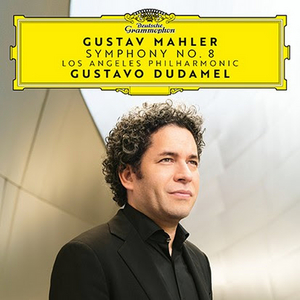Los Angeles Philharmonic Releases 'Gustav Mahler – Symphony No. 8'
Gustav Mahler – Symphony No. 8 documents a landmark performance that brought the LA Phil’s centennial season to a triumphant conclusion in 2019.

Gustav Mahler's mighty Eighth Symphony spans a universe of emotions, channelled through everything from passages of intimate reflection to overwhelming outbursts of choral and orchestral sound. This extraordinary work can now be heard in a revelatory interpretation from Gustavo Dudamel, the Los Angeles Philharmonic, massed choirs and a masterful assembly of solo voices, recorded live at Walt Disney Concert Hall (May 30/31 & June 2, 2019). Set for release today on all relevant digital platforms, Gustav Mahler - Symphony No. 8 documents a landmark performance that brought the LA Phil's centennial season to a triumphant conclusion in 2019.
Following the announcement from Apple Music that it is introducing Spatial Audio with support for Dolby Atmos, DG is delighted to report that listeners will be able to enjoy both the brand-new release and the entire Yellow Label catalog of Gustavo Dudamel and the LA Phil via this revolutionary form of audio experience. Their recordings include the Grammy-winning albums of 2020 and 2021 in the orchestral category-Andrew Norman: Sustain and Charles Ives - Complete Symphonies-as well as landmark releases of the past decade such as Celebrating John Williams, Tchaikovsky's The Nutcracker, Stravinsky's The Firebird and Debussy's La mer, major symphonic pieces by Bartók, Berlioz and Brahms, and seminal works by John Adams.
Dudamel, the LA Phil and Deutsche Grammophon are all innovation leaders in the music world, and the conductor has welcomed the news: "There are no words to describe the immersive, overpowering experience of being a conductor leading a performance of Mahler's towering 'Symphony of a Thousand.' But now, technology is advancing to bring that experience closer to our ears, our minds and our souls. Share with me this monumental live performance with my beloved Los Angeles Philharmonic, remastered in Dolby Atmos audio technology for the first time on Apple Music alongside my collection of Deutsche Grammophon recordings with the LA Phil, in rich, remarkable 3D sound."
This new album builds on foundations set early during Dudamel's tenure as Music & Artistic Director of the LA Phil. Their Mahler Project, a near-superhuman undertaking that presented the composer's nine symphonies within a month in 2012, attracted global attention and rave reviews. They have since programmed Mahler's music at home and on tour, deepening their sense of its meaning and preparing the way for their captivating performance of the Eighth Symphony in May 2019, hailed by Stage and Cinema as "a once-in-a-lifetime experience."
Although the piece has been known since the time of its first performance in 1910 as the "Symphony of a Thousand," Dudamel's vision of the work was richly served by a total of 346 performers. The Los Angeles Philharmonic was joined by the Los Angeles Master Chorale, Pacific Chorale, Los Angeles Children's Chorus and National Children's Chorus (and their respective artistic directors: Grant Gershon, Robert Istad, Fernando Malvar-Ruiz and Luke McEndarfer) and soloists Tamara Wilson, Leah Crocetto, Erin Morley, Mihoko Fujimura, Tamara Mumford, Simon O'Neill, Ryan McKinny and Morris Robinson.
Gustavo Dudamel, reported the Los Angeles Times, "had the orchestra, chorus and soloists sculpt phrases as though they were questions needing deep investigation. One idea followed the next as in an inexorable argument that, when it reached the end of the movement, was not just physically thrilling but like discovering the inevitable and the ineffable." Other critics were moved by the interpretation's "thrills and chills" (San Francisco Classical Voice) and by the "exuberant, joyous and playful" conductor's "complete control" of his forces (ConcertoNet.com).
Mahler challenged symphonic convention in this work by writing parts for eight solo singers, two monumental mixed adult choruses and children's choir, and dividing the piece into two movements. He based the first movement on the ninth-century Latin hymn Veni creator spiritus and set words from the closing scene of Goethe's verse tragedy Faust as an extended second part. Together they symbolize the power of divine creation and mankind's redemption through love, themes explored in fine detail by Gustavo Dudamel and his performance partners.
The symphony entered Mahler's mind almost fully formed during the summer of 1906. "I saw the whole piece immediately before my eyes," he told his biographer soon after, "and only needed to write it down, as though it were being dictated to me." The finished score was, he said, "something in comparison with which all the rest of my works are no more than introductions."
Comments

Videos

